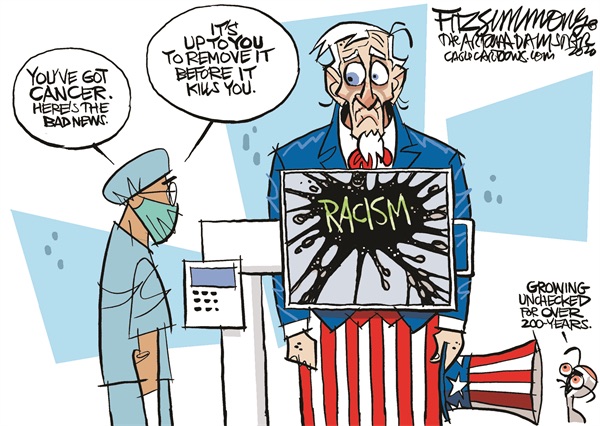Health Care and Racial Justice
To Improve Care, We Must First Recognize the Problems

For many, America is a worldwide emblem of freedom; however, racism has been part of our culture for more than 400 years. From the near eradication and subjugation of Indigenous peoples to the enslavement of kidnapped Africans, we have permitted these past injustices to evolve and remain pervasive throughout our systems.
Some may deny that racism remains a prevalent problem or refuse to acknowledge the need to dismantle systems established by our forebears. However, the statement “I am not racist” is not sufficient to fight racism. By not actively fighting against racist policies and systems, we are complicit in supporting them.
The institutions that structure our society have racism ingrained within them. In the education system, nonwhite schools are less well funded; in the banking and housing systems, Black borrowers — even when financially stable — are disproportionately denied mortgages and redlined out of homes in white areas; in the justice sector, Black people are incarcerated at 5–10 times the rate of white people; and in policing, numerous videos have shown us that George Floyd’s murder, under color of law, is but one of many.
These injustices, while sometimes less obvious in the healthcare system, are no less pernicious. There is a severe shortage of medical facilities, doctors, and pharmacies in BIPOC (Black, Indigenous, People Of Color) communities. This limited access to primary care causes increased illness severity, often requiring hospitalization. Fresh, healthy food options are less available in Black communities, leading to poor nutrition — which contributes to higher rates of diabetes, immune compromise, and adverse cardiovascular events. These communities are often situated near hazardous waste dumps or industrial polluters, leading to higher incidences of asthma and cancer. Such societal constructs lead to subpar medical care and relatively poorer health.
What happens when the Black, Indigenous, and People Of Color get through the systemic gauntlet and into a hospital? Consider these statistics: Both infant and maternal mortality rates are significantly higher in the Black population — irrespective of income or education. Black and Latino patients presenting to emergency rooms with heart failure are less likely to be admitted to the cardiology service. Black patients have longer wait times for kidney transplants. Our health-care system spends more money per capita on white patients, yet Black mortality rates are higher from diabetes, asthma, cancer, and more.
Indeed, these healthcare inequities are prevalent right here in our community. In Santa Barbara county, 18 percent of Latino and 9 percent of Black individuals are uninsured compared to only 4 percent of white individuals. Among infants, 15 percent of Black babies in the county have a low birth weight while Latino and white infants have rates of 7 percent and 6 percent respectively. Per 100,000 persons, the rate of preventable hospitalizations for Black patients is 1,216 compared to 501 for white patients and 320 for Latino patients.
The COVID-19 pandemic has further emphasized the depth of these disparities. While 1 in 1,020 Black Americans, 1 in 1,220 Indigenous Americans, and 1 in 1,540 Latino Americans have died, the death rate for white Americans is 1 in 2,150. One contributing factor is likely that Black and Latino workers disproportionately hold low-wage “essential jobs” — work that involves close contact for long hours.
A commonly cited explanation of adverse health outcomes is genetic differences between races. However, studies have repeatedly found more genetic variation within racial groups than between them. Furthermore, eugenics theories have, historically, been advanced to justify racist policy preferences. In the American medical community, the Tuskegee Syphilis Study and the widespread, coerced sterilization of Black women are but two examples.
A wealth of research demonstrates that health differences are more likely due to the experience of being Black. Beyond the systemic issues previously mentioned, Black people experience health disparities caused by the physical effects (e.g. elevated cortisol levels) of daily chronic stress due to microaggressions, humiliations, fear of police encounters, and incarceration. These are the cultural underpinnings of structural racism.
Structural racism, according to the Aspen Institute, is “a system in which public policies, institutional practices, cultural representations, and other norms work in … reinforcing ways to perpetuate racial group inequity.” In health care, this is manifested in myriad ways: assumptions in medical textbooks, the skin color of resuscitation manikins, and Black or Latino underrepresentation in medical schools. This underrepresentation further contributes to inequities in health outcomes. For example, Black infants are far likelier to survive hospitalization when cared for by Black physicians.
Implicit bias on the part of physicians plays a role, too — a consequence of growing up with our culture’s messages. This doesn’t mean a health-care worker is overtly, or even consciously, racist — simply unaware of bias. To change these attitudes, we have to first be aware of them. We must challenge and rebuild our current biased health-care system.
Structural racism is a determinant of health, whether through deprivation, discrimination, toxic exposure, or poor care. To be true to our calling, health-care workers must actively seek ways to ameliorate these negative outcomes. This should be addressed at every level, starting with acknowledgement of the problem and ending with equitable health care for all.
As health-care workers, we need to recognize that structural racism is embedded in our society and directly causes disparities in health-care access and outcomes. We must name racism as the public health emergency that it is and work actively to dismantle current systems that perpetuate it. Part of our work as healers is to be the change we wish to see by inspiring action at the local, state, and national level to establish an anti-racist healthcare environment.
The authors, Kristin Fontes MD, Iraa Guleria, Lamont Hunter MPH PA-C, Paty A. Iniguez, James Kahn MD, Morgan Leafe MD MHA, and Bethany Wood RN, are members of the Santa Barbara Healthcare Workers for Racial Justice. They can be contacted at sbracialjustice@gmail.com.



